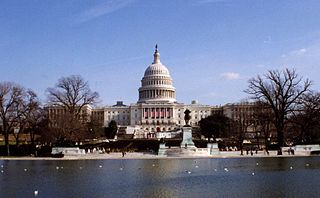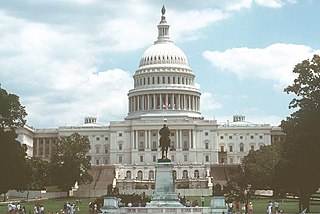
Jesse Francis "Jeff" Bingaman Jr. is an American retired politician who served as a United States Senator from New Mexico from 1983 to 2013. A member of the Democratic Party, he previously served as the 25th Attorney General of New Mexico from 1979 to 1983. During his time in the Senate, Bingaman served as Chairman of Committee Outreach for the Senate Democratic Caucus and was the longtime chair of the Senate Energy Committee.

The 103rd United States Congress was a meeting of the legislative branch of the United States federal government, composed of the United States Senate and the United States House of Representatives. It met in Washington, D.C. from January 3, 1993, to January 3, 1995, during the final weeks of George H. W. Bush's presidency and in the first two years of Bill Clinton's presidency. The apportionment of seats in the House of Representatives was based on the 1990 United States census.

The 102nd United States Congress was a meeting of the legislative branch of the United States federal government, composed of the United States Senate and the United States House of Representatives. It met in Washington, D.C., from January 3, 1991, to January 3, 1993, during the last two years of George H. W. Bush's presidency. This is the most recent Congress where Republicans held a Senate seat from California.

The General Mining Act of 1872 is a United States federal law that authorizes and governs prospecting and mining for economic minerals, such as gold, platinum, and silver, on federal public lands. This law, approved on May 10, 1872, codified the informal system of acquiring and protecting mining claims on public land, formed by prospectors in California and Nevada from the late 1840s through the 1860s, such as during the California Gold Rush. All citizens of the United States of America 18 years or older have the right under the 1872 mining law to locate a lode or placer (gravel) mining claim on federal lands open to mineral entry. These claims may be located once a discovery of a locatable mineral is made. Locatable minerals include but are not limited to platinum, gold, silver, copper, lead, zinc, uranium and tungsten.

The United States Senate Committee on Finance is a standing committee of the United States Senate. The Committee concerns itself with matters relating to taxation and other revenue measures generally, and those relating to the insular possessions; bonded debt of the United States; customs, collection districts, and ports of entry and delivery; deposit of public moneys; general revenue sharing; health programs under the Social Security Act and health programs financed by a specific tax or trust fund; national social security; reciprocal trade agreements; tariff and import quotas, and related matters thereto; and the transportation of dutiable goods. It is considered to be one of the most powerful committees in Congress.

The United States Senate Committee on Environment and Public Works is responsible for legislation and oversight of the natural and built environment and for studying matters concerning environmental protection and resource conservation and utilitization.

The United States Senate Committee on Health, Education, Labor and Pensions (HELP) generally considers matters relating to these issues. Its jurisdiction also extends beyond these issues to include several more specific areas, as defined by Senate rules.

The Senate Committee on Indian Affairs is a committee of the United States Senate charged with oversight in matters related to the American Indian, Native Hawaiian, and Alaska Native peoples. A Committee on Indian Affairs existed from 1820 to 1947, after which it was folded into the Committee on Interior and Insular Affairs. A new Native Affairs Committee was created in 1977, initially as a select committee, as a result of the detachment of indigenous affairs from the new Committee on Energy and National Resources, which had succeeded the old Committee on Interior and Insular Affairs. The committee was initially intended to be temporary, but was made permanent in 1984. The committee tends to include senators from Western and Plains states, who have more Native American constituents.

The United States House Committee on Foreign Affairs, also known as the House Foreign Affairs Committee, is a standing committee of the U.S. House of Representatives with jurisdiction over bills and investigations concerning the foreign affairs of the United States. Since 2023, the chair of the Foreign Affairs Committee has been Michael McCaul of Texas.

The U.S. House Committee on Natural Resources or Natural Resources Committee is a Congressional committee of the United States House of Representatives. Originally called the Committee on Interior and Insular Affairs (1951), the name was changed to the Committee on Natural Resources in 1991. The name was shortened to the Committee on Resources in 1995 by the new chairman, Don Young. Following the Democratic takeover of the House of Representatives in 2006, the name of the committee was changed back to its title used between 1991 and 1995.
The United States Senate Energy and Natural Resources Subcommittee on Public Lands and Forests is one of four subcommittees of the U.S. Senate Energy and Natural Resources Committee.

Martin Trevor Heinrich is an American businessman and politician serving as the senior United States senator from New Mexico, a seat he has held since 2013. A member of the Democratic Party, Heinrich served as the U.S. representative from New Mexico's 1st congressional district from 2009 to 2013. He is the dean of New Mexico's congressional delegation.
The United States House Natural Resources Subcommittee on Energy and Mineral Resources is one of the five subcommittees within the House Natural Resources Committee
The United States House Natural Resources Subcommittee on Federal Lands is one of the five subcommittees within the House Natural Resources Committee. Until the 118th Congress, it was known as the Subcommittee on National Parks, Forests and Public Lands.
The United States House Natural Resources Subcommittee on Insular and Indian Affairs is one of the five subcommittees within the House Natural Resources Committee. It was known until the 118th Congress as the Subcommittee on Indigenous Peoples of the United States.

The Hill Creek Cultural Preservation and Energy Development Act is a United States public law that was introduced into the United States House of Representatives of the 113th United States Congress on January 23, 2013, by Rep. Rob Bishop (R-UT). The law outlines a swap in the ownership of mineral rights of certain pieces of land located in Utah. The United States federal government, Utah's School and Institutional Trust Land Administration (SITLA), and the Ute Indian Tribe of the Uintah and Ouray Reservation are all involved in the exchange.

The Three Kids Mine Remediation and Reclamation Act is a U.S. public law that authorizes the sale of approximately 950 acres of federal land to the city of Henderson, Nevada. The land used to be a mine and now needs significant environmental remediation and reclamation. The bill was introduced into the United States House of Representatives during the 113th United States Congress; a previous version passed the House during the 112th United States Congress, but never received a vote in the Senate. Cleanup efforts of the land are expected to cost between $300 million and $1.2 billion, depending on various estimates and cleanup targets.

The Preventing Government Waste and Protecting Coal Mining Jobs in America is a bill that would amend the Surface Mining Control and Reclamation Act of 1977 to require state programs for regulation of surface coal mining to incorporate the necessary rule concerning excess spoil, coal mine waste, and buffers for perennial and intermittent streams published by the Office of Surface Mining Reclamation and Enforcement on December 12, 2008.
The Interior Board of Land Appeals (IBLA) is an appellate review body that exercises the delegated authority of the United States secretary of the interior to issue final decisions for the United States Department of the Interior.







